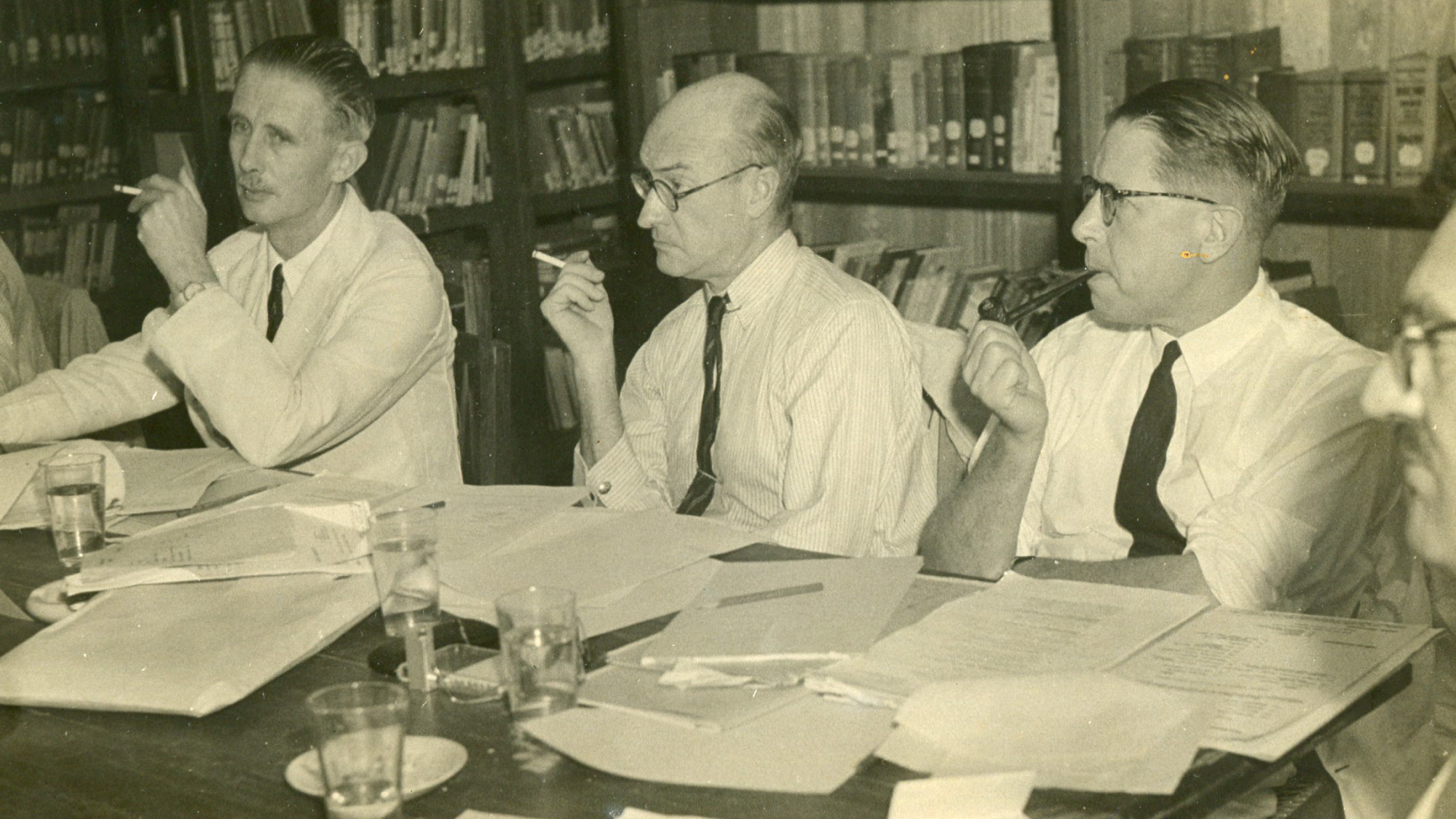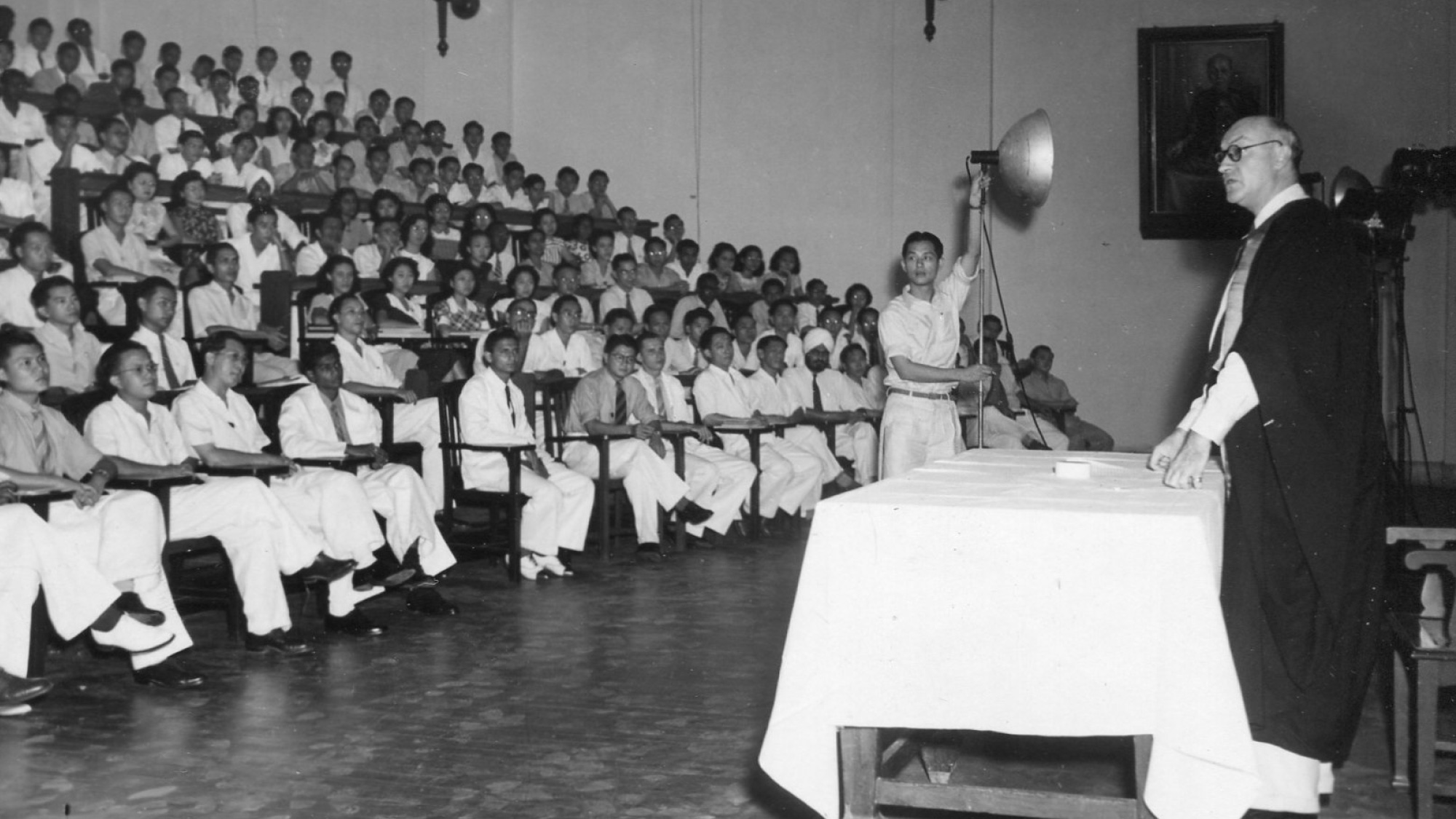Malaria Fighter, Prisoner of War — NUS Medicine’s First Dean
HE USED TO TELL ME, “IF YOU FIND HALF A CATERPILLAR IN YOUR SALAD EAT IT, IT IS GOOD PROTEIN!”
Chief of public health, prisoner of war and general physician to POWs interned at Changi and Sime Road camps, inaugural dean of the Faculty of Medicine in the University of Malaya in 1949 — Dr Desmond William George Faris dedicated his life to the practice and teaching of medicine in colonial and post-war Singapore. His daughter, Ms Sheelagh Knight, pens a remembrance of her late father.
Desmond William George Faris was born in Ennis, County Clare, Southern Ireland (Eire) on April 30, 1901. His father was a doctor and his mother a nurse. The family moved to England in the early 1910s and Desmond was educated at Epsom College. He received his medical training at what was then the London Hospital and thereafter at the London School of Tropical Medicine.
Upon receiving his professional qualifications, he joined the Medical Colonial Service and went to Malaya. He worked ‘up country’ with Dr William Oscar Pou, where they were particularly concerned with the eradication of malaria. He married Doctor Pou’s daughter Olive on March 29, 1930. They lived and worked in various parts of Malaya before moving to Singapore.
He was part of the Public Health Department in Singapore and was soon appointed Chief Health Officer. He was head of Public Health when the war came to Malaya. My brother had been born in Klang in 1932 and was sent back to England to school. I was born in Singapore in the General Hospital in 1937. I remember as a ‘bad dream’, a Japanese bomb going through the roof of our house — fortunately, it did not explode. As the Japanese advanced on Singapore, my father felt it was his duty to remain, in order to maintain as high a standard of public health as might be possible. He was, however able to secure passage for my mother and me to Australia.
He was interned by the Japanese, first in Changi Prison and then later, as that became a camp only for the military, at the Sime Road Camp for civilians. Whilst he was in Changi Prison, the frame of his spectacles unfortunately broke; it was skilfully repaired by another internee using a discarded toothbrush. (The repaired frame was to last until after his liberation!)
In Sime Road Camp, he came to be in charge of the health of the internees, and it was largely because of his insistence on cleanliness and a healthy diet that so relatively few people died there. He used to tell me, “If you find half a caterpillar in your salad eat it, it is good protein!” Towards the end of the war, my father and his team started harvesting snails to provide extra protein for the internees. He was later awarded Commander of the Most Excellent Order of the British Empire (CBE) for services during his internment.
The camp was finally liberated in 1945. My mother was most upset that he did not come back to the UK immediately; he insisted on remaining in Singapore for as long as it took to make sure his fellow internees were suitably cared for.

Dr Faris (centre). Smoking had not yet been recognised as harmful to health.
In 1946 however, he was asked to return to Singapore to become the Principal of the King Edward VII College of Medicine. He helped with the decision to merge that College with Raffles College, and that it should then become the University of Malaya, which happened in 1949. He then became the first Dean of the Faculty of Medicine, a post which he felt honoured to take on. However, as the University was new, there were many tasks that had to be sorted through. He always paid great attention to detail and was constantly concerned that he had got the right answers. Both he and my mother were very good at entertaining the various dignitaries that used to visit. My mother was also very involved with the St John’s Ambulance Brigade in Singapore.
My parents returned to England in 1955 upon my father’s retirement. He was delighted to have had a lecture hall in the Faculty named after him, as he was also to receive an Honorary Doctorate of Laws from the University. Sadly, he died of a coronary thrombosis on March 20, 1957 before he and my mother could really enjoy retirement. My last memory of him is saying goodbye on the station platform as I returned to London, and him telling me how difficult it was to talk about his wartime experiences, except with those who had also survived them.
On Tuesday, November 2, 2016 my daughter Catharine and her husband Nick Brode were warmly welcomed to the Faculty of Medicine (now known as the NUS Yong Loo Lin School of Medicine) on a short visit. Both they and I would like to express our profound appreciation for the honour and courtesy extended to them as descendants of my father, Dr Faris, by all their hosts from the School that day.

Dr Faris giving a lecture.
